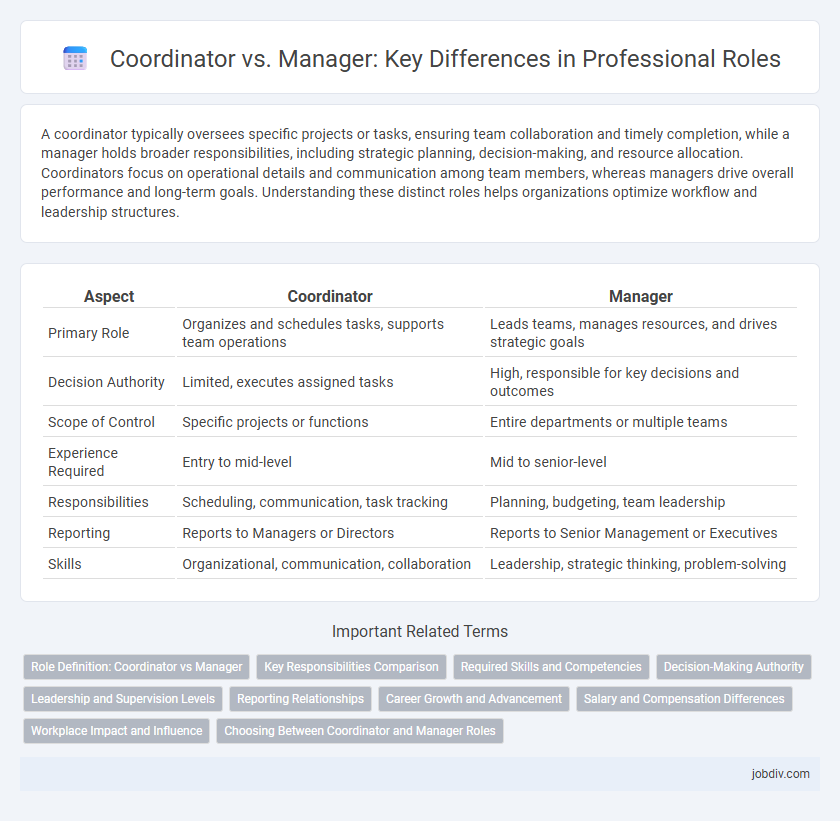A coordinator typically oversees specific projects or tasks, ensuring team collaboration and timely completion, while a manager holds broader responsibilities, including strategic planning, decision-making, and resource allocation. Coordinators focus on operational details and communication among team members, whereas managers drive overall performance and long-term goals. Understanding these distinct roles helps organizations optimize workflow and leadership structures.
Table of Comparison
| Aspect | Coordinator | Manager |
|---|---|---|
| Primary Role | Organizes and schedules tasks, supports team operations | Leads teams, manages resources, and drives strategic goals |
| Decision Authority | Limited, executes assigned tasks | High, responsible for key decisions and outcomes |
| Scope of Control | Specific projects or functions | Entire departments or multiple teams |
| Experience Required | Entry to mid-level | Mid to senior-level |
| Responsibilities | Scheduling, communication, task tracking | Planning, budgeting, team leadership |
| Reporting | Reports to Managers or Directors | Reports to Senior Management or Executives |
| Skills | Organizational, communication, collaboration | Leadership, strategic thinking, problem-solving |
Role Definition: Coordinator vs Manager
A Coordinator organizes and monitors specific tasks or projects to ensure smooth execution, often acting as a communication hub between team members. In contrast, a Manager holds broader responsibilities, including strategic planning, decision-making, and overseeing overall team performance and resource allocation. Both roles require leadership skills, but a Manager typically has higher authority and accountability within organizational hierarchy.
Key Responsibilities Comparison
Coordinators primarily focus on organizing schedules, facilitating communication, and ensuring tasks align with project timelines supporting team members' efficiency. Managers hold broader responsibilities including strategic planning, decision-making authority, and overseeing team performance to achieve overall organizational goals. The distinction lies in coordinators managing operational details while managers drive high-level objectives and resource allocation.
Required Skills and Competencies
Coordinators require strong organizational abilities, attention to detail, and effective communication skills to ensure smooth project execution and team collaboration. Managers need advanced leadership competencies, strategic thinking, and decision-making capabilities to drive business objectives and manage cross-functional teams. Both roles demand problem-solving skills, but managers are also expected to handle budgeting, performance evaluations, and long-term planning.
Decision-Making Authority
A coordinator typically operates within defined guidelines, facilitating communication and organizing tasks without significant decision-making authority. In contrast, a manager holds substantial decision-making power, responsible for strategy implementation, resource allocation, and resolving conflicts. This distinction highlights the manager's role in shaping outcomes versus the coordinator's focus on executing plans.
Leadership and Supervision Levels
Coordinators typically handle operational tasks and ensure smooth workflow by guiding team members on specific projects, emphasizing task-level leadership. Managers possess higher leadership authority, overseeing broader departments or units, setting strategic goals, and making key decisions to align team efforts with organizational objectives. The supervision level of managers involves direct oversight of coordinators and other staff, fostering a hierarchical structure focused on performance management and resource allocation.
Reporting Relationships
Coordinators typically report to managers or department heads, facilitating communication and ensuring task execution within specific projects or teams. Managers hold accountability for broader operational outcomes and usually oversee multiple coordinators or team leaders, establishing strategic direction and managing performance. Reporting relationships are hierarchical, with managers serving as supervisors to coordinators, enabling efficient workflow monitoring and resource allocation.
Career Growth and Advancement
Coordinators often handle specific project tasks and ensure smooth workflow, providing foundational experience essential for career growth in management roles. Managers oversee broader teams and strategic decision-making, which accelerates advancement into higher leadership positions. Building expertise as a coordinator can serve as a stepping stone to managerial roles, enhancing leadership skills and expanding professional opportunities.
Salary and Compensation Differences
Coordinator roles typically have lower salary ranges compared to managers due to differences in responsibility scope and decision-making authority. Managers often receive higher base salaries, performance bonuses, and additional benefits reflecting their leadership duties and accountability for team outcomes. Market data shows that manager compensation packages can exceed coordinator salaries by 20% to 40%, depending on industry and company size.
Workplace Impact and Influence
Coordinators streamline daily operations by facilitating communication and ensuring task alignment, driving immediate team productivity and efficiency. Managers hold strategic authority, shaping workplace culture and influencing long-term organizational goals through decision-making and resource allocation. The combined impact of both roles enhances operational success, with coordinators managing execution and managers directing overall vision.
Choosing Between Coordinator and Manager Roles
Choosing between coordinator and manager roles depends largely on desired scope of responsibility and leadership level. Coordinators typically handle specific projects or operational tasks, emphasizing organization and communication within teams. Managers oversee broader departmental functions, making strategic decisions and managing personnel to drive overall business objectives.
Coordinator vs Manager Infographic

 jobdiv.com
jobdiv.com